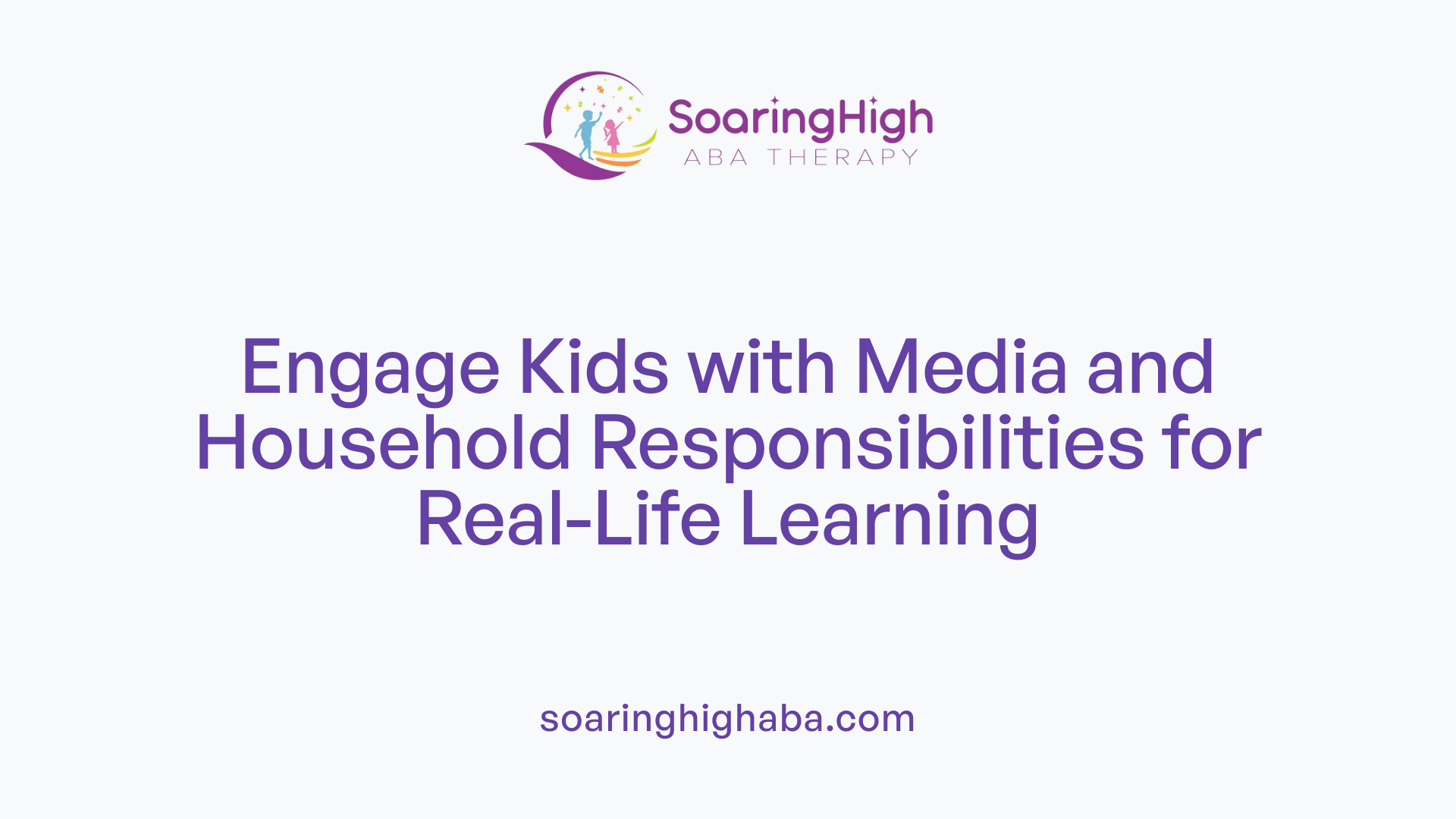Understanding the Importance of Teaching Responsibility and Accountability
Developing responsibility and accountability are vital aspects of fostering well-rounded, emotionally resilient children and teens. These skills promote independence, trust, and personal growth, preparing young individuals for the challenges of adulthood. Integrating behavioral strategies, especially through evidence-based practices like Applied Behavior Analysis (ABA), can significantly enhance the effectiveness of teaching these essential life skills.
Core Strategies for Teaching Responsibility and Accountability

What are effective strategies for teaching responsibility and accountability to children and adolescents?
Teaching responsibility and accountability involves a combination of clear communication, consistent practices, and supportive guidance. Setting clear expectations helps children understand what behaviors are expected, whether it's completing chores, meeting deadlines, or managing personal belongings. Alongside this, establishing boundaries and applying fair, logical consequences reinforces the importance of responsible actions. Engaging teens in meaningful conversations about why responsibility matters fosters internal motivation. Validating their feelings and encouraging ownership of mistakes builds trust and emotional resilience.
Providing age-appropriate opportunities for independent decision-making—like managing a part-time job, organizing school projects, or handling personal routines—boosts confidence and competence. Modeling responsible behavior, such as admitting to and learning from one's own mistakes, sets a powerful example. Implementing positive reinforcement, like praise or rewards such as allowances and outings, promotes a growth mindset. Gradually increasing responsibilities helps children develop integrity, self-esteem, and the skills necessary for responsible adulthood.
What are the best ways for caregivers to implement responsibility and accountability skills in children?
Caregivers play a crucial role in fostering responsible behavior. Consistency is vital: establishing daily routines, clear expectations, and age-appropriate responsibilities like chores or managing schedules reinforce accountability. Demonstrating responsible conduct, including owning mistakes and fulfilling promises, provides a living model for children.
Using logical and natural consequences—such as not washing clothes if unwashed or receiving poor grades after neglecting studying—helps children connect actions with outcomes. Timely rewards for responsible behavior further reinforce positive habits. Educational activities that include goal setting, reflection, and learning from mistakes cultivate self-awareness and resilience. Offering leadership opportunities and encouraging honest communication deepen the sense of ownership, constructing a solid foundation for lifelong responsibility.
How can parents and educators foster emotional maturity, independence, and resilience in children?
Building emotional maturity and resilience requires supportive environments and positive modeling. Parents and teachers should create safe spaces where children feel valued and secure to express themselves. Encouraging problem-solving and problem-based learning builds confidence and decision-making skills.
Teaching emotional awareness—recognizing feelings, practicing self-regulation techniques like deep breathing, and discussing emotions openly—helps children manage their responses. Maintaining consistent routines and honest communication provides stability, teaching children that setbacks are part of growth. Supporting social interactions through family activities, peer groups, and community involvement strengthens resilience by offering dependable support during challenges.
Involving children in age-appropriate responsibilities, celebrating effort, and encouraging safe risk-taking and reflection contribute significantly to their independence and emotional strength. These strategies collectively develop adaptable, confident, and resilient individuals.
How can discipline and behavioral interventions support child development and emotional health?
Discipline grounded in understanding and respect promotes healthy development. Employing positive strategies—like logical consequences, praise, and teaching replacement behaviors—helps children develop self-control, emotional resilience, and a sense of trust. Avoiding punitive measures such as physical punishment or humiliation is essential.
Addressing emotional needs, such as labeling feelings and validating experiences, enhances emotional intelligence and reduces outbursts. Tailoring discipline to a child's developmental stage ensures it is effective and respectful. Guidance and emotional support foster responsible independence, preventing problem behaviors and nurturing responsible decision-making.
Focus on connection through empathetic communication, using reinforcement to highlight good behavior, and teaching coping skills create a solid foundation for emotional and social competence.
What therapeutic strategies can aid in teaching responsibility and accountability to children and adolescents?
Therapists utilize various strategies, including modeling responsible behaviors, providing clear guidance, and reinforcing positive actions through praise or rewards. Social skills training, problem-solving exercises, and decision-making tasks help children understand the impact of their actions.
Restorative practices—like repairing harm and fostering respectful relationships—strengthen accountability and social understanding. Encouraging participation in daily responsibilities, such as chores and community activities, teaches practical skills and self-reliance.
Finally, emotional regulation techniques, including mindfulness and calm communication, help children manage impulses and responses. These approaches support the gradual development of a responsible and accountable attitude.
In what ways is Applied Behavior Analysis (ABA) therapy used to teach responsibility and accountability to individuals with autism?
ABA therapy employs systematic, evidence-based methods to promote responsibility in individuals with autism. Techniques such as positive reinforcement, prompting, and shaping behaviors are used to develop skills in self-care, social interaction, communication, and executive functioning.
Analyzing antecedents (what happens before a behavior), behaviors, and consequences (the ABCs) allows therapists to tailor interventions that strengthen desired behaviors and reduce problematic ones.
Goals related to responsibility—like completing daily tasks, managing emotions, and seeking help—are incorporated into individualized programs. Continuous assessment and adjustment of strategies ensure progress toward greater independence and accountability.
Through consistent reinforcement and teaching, ABA helps individuals understand the relationship between their actions and outcomes, enhancing their ability to be responsible and accountable in daily life.
The Role of Logical Consequences in Building Responsibility

How can understanding logical consequences help children develop accountability?
Understanding logical consequences plays a vital role in helping children learn accountability. When kids see a clear link between their actions and the outcomes, they start to grasp the concept of cause and effect.
For example, if a child refuses to do their household chores, a logical consequence might be losing privileges such as screen time. If they forget to turn in their homework, they might receive a lower grade. Paying a fine after receiving a speeding ticket illustrates how real-world actions have tangible results.
This approach encourages children to think critically about their choices. They realize that their behavior directly impacts their circumstances, which fosters emotional intelligence and personal responsibility. When consequences are predictable and directly related to the behavior, children are more likely to internalize lessons about accountability.
Logical consequences help children develop problem-solving skills because they must figure out how their actions lead to specific outcomes. Instead of feeling punished unfairly, kids view these outcomes as learning experiences that guide them to make better decisions in the future.
Promoting critical thinking and problem-solving
By understanding and experiencing logical consequences, children learn to anticipate potential results of their actions. This not only promotes responsible behavior but also enhances their decision-making skills.
For instance, a child who consistently forgets their chores might develop a checklist system to stay organized, learning to be accountable for their responsibilities. Similarly, noticing that playing video games all day results in missing out on fun activities or falling behind in school motivates better time management.
Through these experiences, children develop resilience, understanding that setbacks are part of growth. They learn to analyze situations, weigh options, and solve problems on their own, laying the groundwork for emotional stability and independence.
Real-world examples of logical consequences
- Losing privileges when chores are neglected: A child who refuses to do their chores may lose access to electronics or social outings until responsibilities are fulfilled.
- Financial consequences for rule-breaking: Paying a fine after a speeding ticket teaches the importance of following safety rules and personal accountability.
- School-related accountability: Missing homework results in lower grades, pushing students to plan and prioritize their tasks better.
Using these real-life scenarios helps children see how responsibility impacts everyday life, making learning meaningful and applicable.
How do these methods support emotional resilience?
Implementing logical consequences in a consistent and caring manner gives children a sense of security and control. They learn that their actions have predictable outcomes, which reduces anxiety and builds confidence.
When children understand and accept the consequences of their actions, they gain skills in self-regulation, adapting their behavior based on previous experiences. This ongoing process enhances emotional regulation, problem-solving, and the ability to cope with setbacks.
The bigger picture: Developing responsible, independent individuals
When children learn to connect their actions with real-world outcomes through logical consequences, they develop a stronger sense of responsibility and accountability. This foundation prepares them for adulthood, where responsibility and resilience are crucial.
By fostering these skills early on, parents, educators, and caregivers help cultivate well-rounded individuals ready to navigate life's challenges with confidence and integrity.
| Concept | Examples | Benefits |
|---|---|---|
| Cause-and-effect understanding | Completing chores, paying fines | Fosters responsibility, problem-solving |
| Promoting critical thinking | Anticipating consequences, planning tasks | Enhances decision-making |
| Practical applications | Losing privileges, earning rewards | Builds accountability and resilience |
| Emotional and social growth | Handling setbacks, owning mistakes | Develops emotional regulation, independence |
Using consistent, real-world logical consequences supports children in becoming responsible, emotionally resilient individuals, better equipped for the responsibilities of adult life.
Utilizing Examples and Practical Applications

How can movies and shows be used to teach accountability?
Familiar media like movies and television shows offer engaging platforms for teaching children about responsibility and accountability. Parents and educators can discuss characters' actions and the consequences they face. For instance, a character who cheats on a test and then faces disciplinary action demonstrates the value of honesty. Such examples help children understand that their choices have real impacts.
Role-playing scenes from popular shows where characters deal with moral dilemmas encourages children to reflect on their own decisions. For example, reenacting a scenario where a character admits to a mistake can foster openness and ownership of actions. Analyzing these stories makes the abstract concepts of responsibility concrete and relatable.
Using well-known stories also sparks discussions about ethics and personal values, making learning engaging and memorable. Children see familiar characters face similar challenges, which supports understanding and internalizing lessons about accountability.
Managing household chores and establishing responsibilities
Setting clear expectations around household chores is an effective way to develop responsibility. Assigning tasks such as tidying rooms, doing laundry, or emptying the dishwasher teaches daily responsibility. Consistent routines help children understand the importance of contributing to the family community.
When chores are not completed, applying logical consequences reinforces accountability. For example, if children forget to wash their clothes, they may need to wait until laundry day to wear clean clothes. This connects their actions to outcomes, emphasizing cause-and-effect.
Encouraging children to manage their school materials or prepare simple meals also builds independence. These responsibilities help them feel competent and confident.
Handling missed curfews responsibly
When a teenager exceeds curfew, parents can guide them through responsible handling of the mistake. Open discussions about why the curfew was important and the impact of missing it help develop understanding.
Applying logical consequences, like an earlier bedtime the following night, teaches that actions have direct outcomes. This approach fosters accountability and can reduce future violations.
Supporting the teen’s emotional response by validating feelings acknowledges their perspective, while also reinforcing the importance of adhering to agreed boundaries.
Promoting responsibility in academic work
Ensuring children complete homework and meet deadlines is another practical method for instilling responsibility. Setting specific routines and providing organizational tools can support consistent effort.
When children miss deadlines, discussing the consequences—such as receiving a lower grade or needing to redo an assignment—illustrates the link between effort and outcomes. Reflecting on these experiences encourages better future planning.
Teachers can incorporate responsibility-building activities in classroom settings, like peer assessments or leadership roles, which foster accountability.
Encouraging community involvement and ownership
Participation in community service or managing allowances enhances practical understanding of responsibility. Volunteering teaches children about giving back and being accountable to others.
Managing allowances or money for outings encourages financial responsibility. Children learn budgeting and decision-making through these experiences.
Summarizing educational approaches
| Strategy | Description | Example |
|---|---|---|
| Media examples | Discuss characters' choices and consequences | Analyzing a story where honesty is rewarded or dishonored |
| Household chores | Assigning and following through with responsibilities | Tidying rooms, laundry, and chores |
| Managing curfew | Setting clear boundaries with logical consequences | Early bedtime for missing curfew |
| Academic responsibilities | Completing tasks and understanding outcomes | Finishing homework, meeting deadlines |
| Community and financial roles | Volunteering, allowances, and decision-making | Participating in neighborhood cleanups, budgeting allowances |
Developing responsibility through these practical applications nurtures trust, emotional maturity, and independence. When children learn to recognize their actions and consider their consequences, they build resilience and problem-solving skills essential for adulthood. Incorporating familiar media not only makes these lessons accessible but also engaging, fostering a lifelong understanding of accountability.
Fostering a Responsible Future
Integrating a variety of behavioral and therapeutic strategies, including ABA, logical consequences, and modeling, provides a comprehensive framework for teaching responsibility and accountability. These skills, cultivated through consistent practice, reflection, and positive reinforcement, lay the groundwork for responsible independence and emotional resilience. As children and adolescents develop these vital traits, they are better equipped to navigate life's challenges, establish trustful relationships, and contribute positively to their communities. Creating supportive environments—whether at home, school, or through specialized therapies—empowers young individuals to grow into responsible and resilient adults, shaping a better future for all.
References
- How to Encourage Accountability and Responsibility in ...
- Foster Responsibility and Accountability in Laurel Springs
- How Logical Consequences Teach Emotional Resilience
- The Lessons Responsibility Can Teach
- Applied Behavior Analysis (ABA)
- Independence in Individuals with Autism: Role of ABA ...
- 6 Benefits of ABA Therapy for Children with Autism
- The Role of ABA Therapy in Supporting Children with Autism





































































































